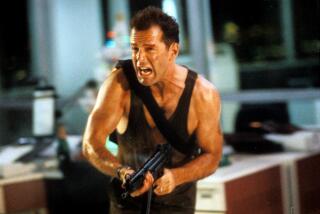‘The Alamo’ mission
Harvey Weinstein has nothing on Chill Wills.
Weinstein, long considered the king of the Oscar campaign blitz, might well have taken a page from the 1961 playbook of the veteran character actor’s publicist.
Hollywood at that time had never seen anything like the crusade Wills’ publicity agent launched to get his client the supporting actor Oscar for the 1960 John Wayne epic “The Alamo.”
The Texas-born Wills had been performing since he was a kid and was the leading member of the Avalon Boys singing group. At 26, the group disbanded, and Wills, who possessed a distinctive, gravelly Texas drawl, rebranded himself as an actor in the 1930s.
His career took off, and he became much in demand, appearing in such classics as 1940’s “Boom Town” and “The Westerner,” 1944’s “Meet Me in St. Louis,” 1946’s “The Harvey Girls” and “The Yearling,” and 1956’s “Giant,” in which he played the warmhearted Uncle Bawley. He was perhaps best known, though, as the voice of the cynical talking mule Francis, playing opposite Donald O’Connor in a series of popular comedies in the 1950s.
Though the three-hour-plus “The Alamo,” which marked Wayne’s directorial debut, got mixed notices, Wills’ performance as Davy Crockett’s friend Beekeeper earned him enthusiastic reviews and a supporting actor Oscar nomination.
Wills hired veteran press agent W.S. “Bow-Wow” Wojciechowicz to run an ad campaign in pursuit of the Oscar. Bow-Wow took campaigning to the extreme.
One of his ads ran the name of every academy member alphabetically with a picture of Wills that read: “Win, lose or draw, you’re all my cousins and I love you all.”
Groucho Marx replied with his own ad: “Dear Mr. Chill Wills: I am delighted to be your cousin but I voted for Sal Mineo.” (Mineo had been nominated in the supporting actor category for his role in “Exodus.”)
Ironically, the same day the Hollywood Reporter ran Marx’s rebuttal ad, another Bow-Wow special appeared on the opposite page.
This ad featured a photo of the cast of “The Alamo” with a picture of Wills in his buckskin breeches superimposed over them. The ad line proclaimed: “We of the ‘Alamo’ cast are praying harder -- than the real Texans prayed for their lives in the Alamo -- for Chill Wills to win the Oscar as best supporting actor. Cousin Chill’s acting was great. Your Alamo cousins.”
Though Variety refused to run the cast ad, it did publish Wayne’s rebuke letter, which stated that he and the cast and crew of the movie had no advance knowledge of the ad:
“No one in the Batjac [his production company] or in the Russell Birdwell office [his publicist] had been a party to his trade paper advertising. I refrain from using stronger language because I am sure his intentions are not as bad as his taste,” the ad proclaimed.
(Of course, Birdwell was no shrinking violet when it came to obtaining ink for “The Alamo,” getting seven states to declare an “Alamo Day” before the film was even released.)
Bow-Wow acknowledged that Wills didn’t know about the Reporter ad and apologized for having run it. But the damage was done. Wills fired him and went on the offensive in the press, talking about how Bow-Wow had hurt his good reputation.
Not only did Wills lose the Oscar to Peter Ustinov for his work in “Spartacus,” the $12-million “Alamo,” which had been nominated for seven Academy Awards, including best picture, went home with just one Oscar -- for best sound.
It wasn’t long after the Chill Wills- Bow Wow campaign lowpoint that the studios took over the responsibility for marketing the “for your consideration” award ads.
As for Wills, he continued to act until his death in 1978 at the age of 76, appearing in such films as “McLintock!” with Wayne, “The Rounders” and Sam Peckinpah’s “Pat Garrett & Billy the Kid.”
He never did win an Oscar.


